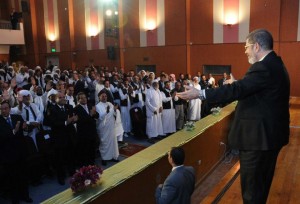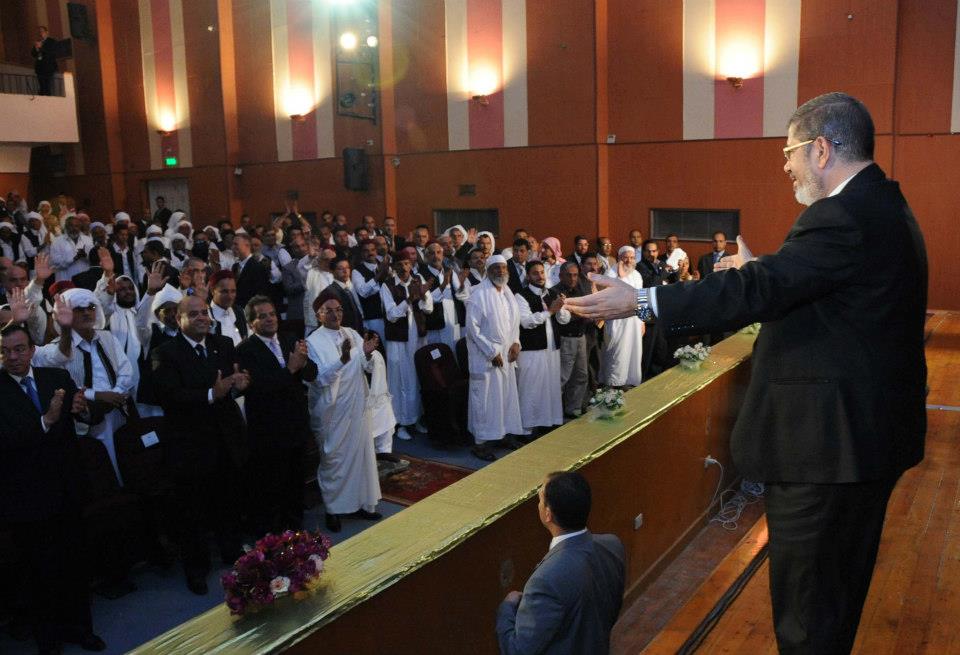
President Mohammed Morsy visited Marsa Matruh on Friday and was met by around 4,000 people including protestors calling for the dismissal of General Taha Mohamed Al-Sayed, the governor of the region. During his speech Morsy assured the citizens of Matruh that he will remove Al-Sayed from his post and added that he is aware of the problems in Matruh and he will work to solve them. He has invited a delegation to come to Cairo in order to discuss their issues and as a result the protestors have ended their 28 day sit-in.
Morsy’s visit had been eagerly awaited by the various groups including the United Revolutionary Movement of Matruh (Takawa) and the regional branch of the 6th April youth movement who have been calling for the dismissal of the governor of the Matruh province, as well as a variety of other demands. Spokesperson for Takawa, Khaled Al-Seniny said “There was a high security presence before and during the president’s visit, but the day was peaceful.”
In his speech Morsy said “I want you all to return to your homes, satisfied that your demands will be met. Your message has been received.” The protestors have demanded jobs for the youth, a cleaner city, clean drinking water, better medical facilities and for a genuine security presence in Matruh. The citizens of El-Dabaa also joined the sit-in over the building of a nuclear energy plant. Some of the citizens of El-Dabaa claim that their land has been taken from them to allow the building of the plant and there are also safety concerns.
Morsy addressed the majority of these issues in his speech and made a number of commitments. According to Dr Ahmed Zakaria, a member of 6th April, “He promised us that he would change the governor.” This has been welcomed by the protestors as they have been seeking for the removal of Al-Sayed and for the installation of a civilian governor. The protest previously had success on this issue after a civilian staff member was appointed in September.
Morsy also committed to solving the water problems in Marsa Matruh and the safety of the residents of Matruh in regards to the nuclear energy plant in El-Dabaa. Zakaria said “the president promised to give money to the people in El-Dabaa who have lost their land.”
Al-Seniny said “the president has invited a delegation of 20-30 people to come to Cairo on 6 November to discuss our problems and find solutions.”
In response to Morsy’s speech, Al-Seniny said “We are very happy. The president came to Matruh and told us he knows all about our strike and the issues of Matruh. He told us to end our strike and that he will solve the problems of Matruh.” Al-Seniny continued, “He spoke about the issue of land ownership, the problems of the nuclear energy plant in El-Dabaa and the water in Marsa Matruh, these are all very important issues and we are happy that they will be solved.”
Zakaria said, “We will meet on Saturday evening to choose the people who will best represent us in Cairo. We have prepared files on each topic and we will present our problems to the president.”
The Matruh governorate’s geographical location on the border with Libya makes it an important military zone. The governorate has traditionally been staffed by military officers and the sit-in called for civilian staff and civilian rule.
The positive response Morsy received from his visit was summed up by Al-Seniny, who said “The president is welcome in our homes, he is like our father.” Zakaria said, “I elected him and I trust him but we will see if he deserves this trust. We will protest again if he breaks his promise.”




